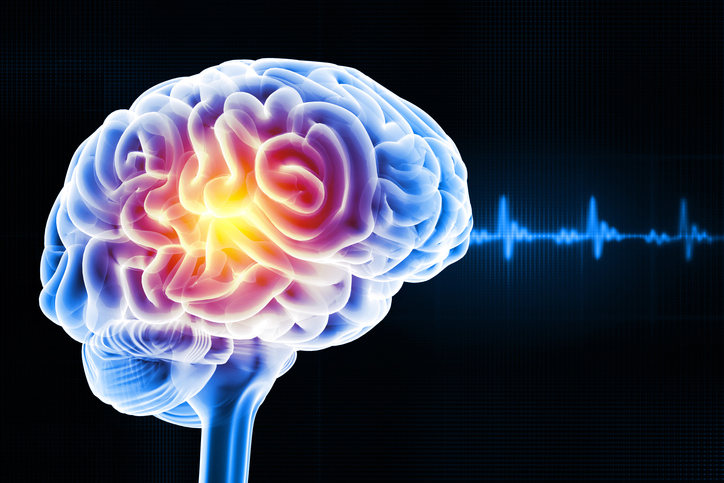
A brain injury can change your life in ways you might not imagine. It can change everything such as your independence, relationships, and everyday activities. Whether the injury is the result of an accident or a medical condition, compassionate and professional support is going to be the key to recovery and maintaining your quality of life. We want to help you understand the different types of brain injuries to help you make informed decisions about care and support.
Traumatic Brain Injuries (TBI)
Traumatic brain injuries are caused by an external force hitting the head. This causes physical damage to the skull and brain. This could be from a fall, a car accident, or a sports injury, for example. The effects of a TBI can range from mild to severe, and everyone’s experience will be completely different.
Here are some common types of traumatic brain injuries, some more mild than others:
Concussion: Usually considered a mild form of brain injury, but it can still cause temporary confusion, headaches, and memory issues. With rest and proper care, recovery is likely. But, repeated concussions can have lasting effects.
Contusion: A contusion is bruising or bleeding within the brain tissue, usually caused by a direct impact to the head. In some cases, surgery is needed to relieve the pressure and prevent further complications.
Penetrating Injury: These injuries occur when an object pierces the skull and damages the brain. This could be shattered bone or a foreign object from an assault or accident.
Diffuse Axonal Injury: Caused by rapid movement of the brain within the skull, this type of injury can lead to widespread damage, affecting communication between brain cells. Recovery often requires long-term rehabilitation and support.
Acquired Brain Injuries (ABI)
Unlike traumatic brain injuries, acquired brain injuries occur due to non-traumatic causes, such as medical conditions or other health-related issues. These injuries can develop gradually or occur suddenly, and usually require ongoing care and support.
Common types of acquired brain injuries include:
Anoxic Brain Injury: This happens when the brain is completely deprived of oxygen, leading to cell damage. Situations like cardiac arrest, drowning, or respiratory failure can result in this type of injury.
Hypoxic Brain Injury: In this case, the brain receives some oxygen, but not enough to function properly. Conditions such as stroke, carbon monoxide poisoning, or complications during surgery can cause hypoxic injury.
Stroke-Related Injuries: Strokes happen when blood flow to the brain is disrupted, either by a clot (ischaemic stroke) or bleeding (hemorrhagic stroke). The effects can range from mild weakness to severe physical and cognitive impairments.
Infections: Brain infections, such as meningitis or encephalitis, can cause inflammation and long-term complications, requiring specialised care and rehabilitation.
Mild vs. Severe Brain Injuries
Brain injuries can vary greatly in severity. Mild injuries, such as concussions, often result in temporary symptoms that improve with rest and proper care. Severe brain injuries may lead to lasting physical, emotional, and cognitive challenges. If you or your loved one is facing a severe injury, ongoing support can make a significant difference in maintaining independence and quality of life.
Diagnosis and Treatment
Getting the right diagnosis is obviously essential for effective treatment and recovery. Healthcare professionals use a combination of physical assessments, imaging tests such as MRI or CT scans, and cognitive evaluations to determine the severity of the injury. The sooner treatment begins, the better the chances for a positive outcome.
Treatment plans are tailored to each person’s needs and may include:
Medical Care: Immediate treatment to stabilise the condition and prevent further damage.
Rehabilitation: Physical therapy, occupational therapy, and speech therapy to regain lost skills and improve quality of life.
Emotional Support: Counselling and psychological support to help cope with changes and adjust to new routines.
Live-in Care Support: Compassionate carers can provide assistance with daily activities, medication management, and companionship, ensuring individuals feel supported in their own homes.
Living with a Brain Injury
A brain injury can bring so many changes, but with the right support, you or your loved one can continue to lead a fulfilling life. At Eximius Support, we understand the challenges that come with brain injuries, and we are here to provide tailored, high-quality care that prioritises dignity and comfort. Whether it’s short-term recovery support or long-term assistance, we are committed to making a positive difference. If you or a loved one need compassionate, professional live-in care, reach out to us today. We are here to help every step of the way.
Further Reading:
Supporting Our Clients With Brain Injuries
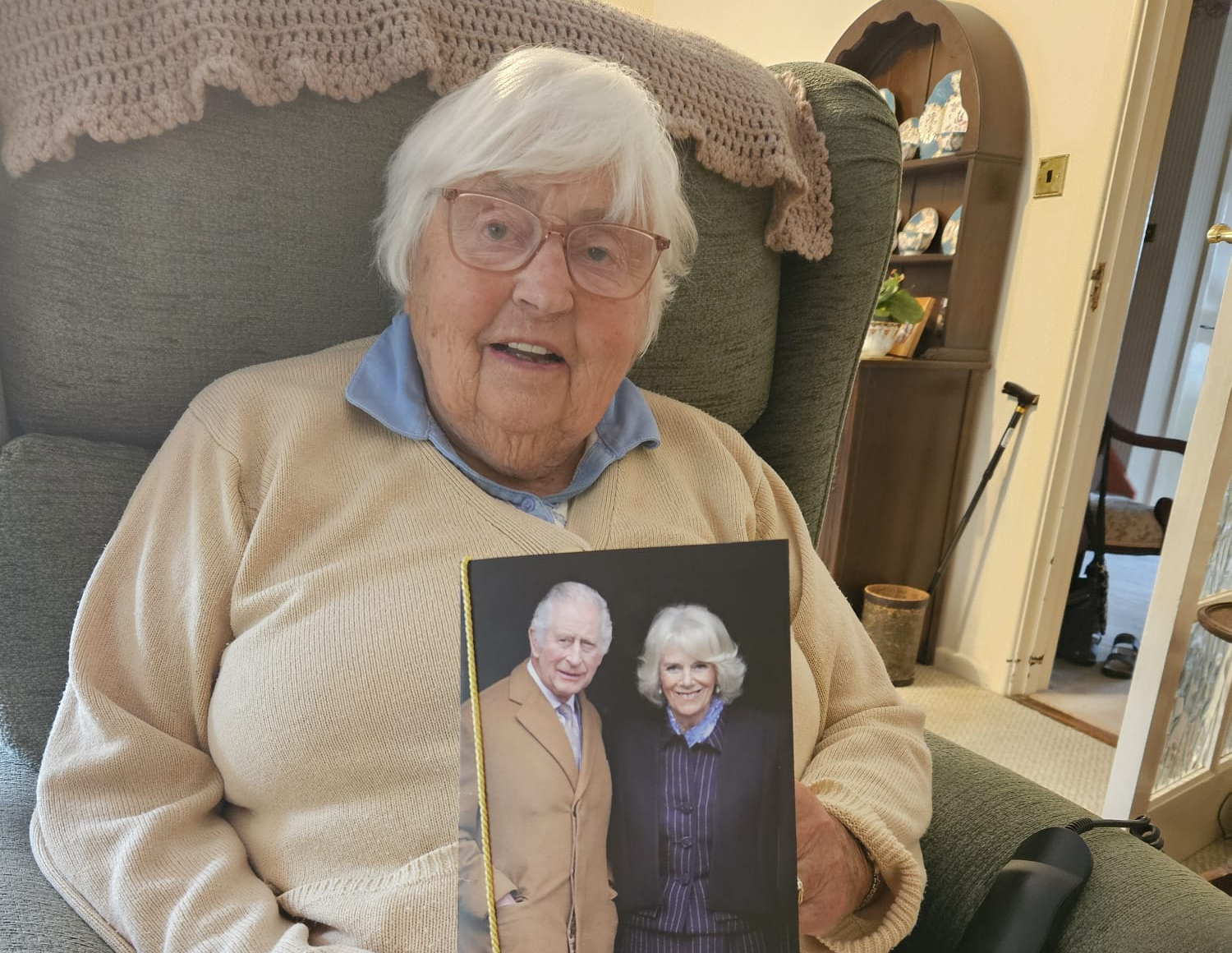
Our client has just celebrated an exciting milestone recently when she turned 100 years old.
Helen, who lives in her home with the support of Eximius Support, celebrated her 100th birthday with a luxury afternoon tea.
She was treated to afternoon tea at the Rhinefield House Hotel by Eximius, enjoying the outing with her complex care supervisor, Dawn Dowdican, her clinical lead, Dawn Sears and her main companion carer, Shona.
Helen has enjoyed an incredible life full of adventure and has no plans of stopping just yet, enjoying daily outings including outings to the New Forest in her electric wheelchair. She was also a highly accomplished equestrian and tennis player.
A World War II veteran, Helen joined the Auxiliary Territorial Service at the age of 18, after dropping out of the Domestic Science College to serve as an army driver. After the war, she returned to the college, proudly passing the course as the first person to ever graduate with First Class Honours.
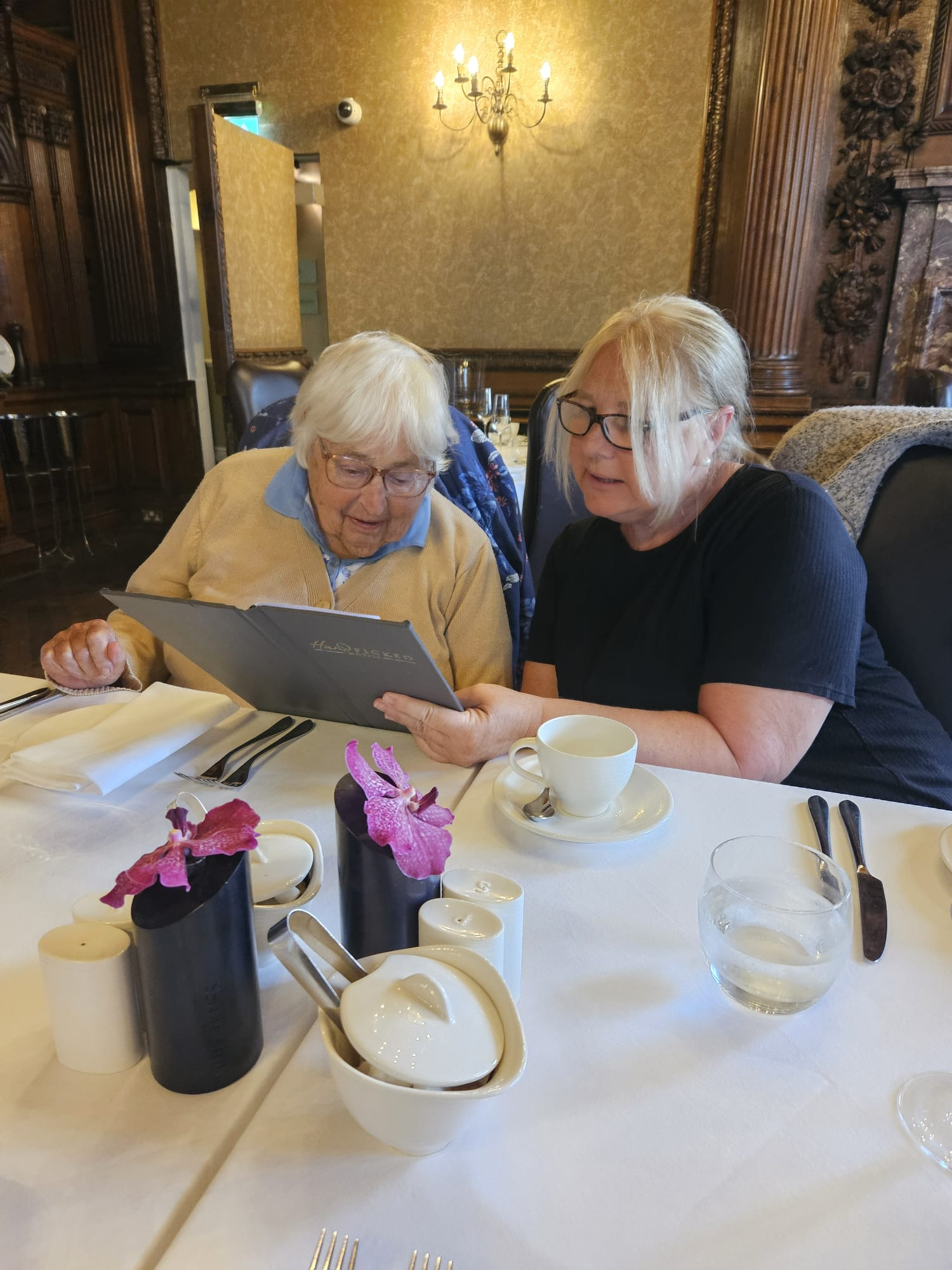

When asked what the secret to a long and healthy life was, Helen responded:
“Staying fit and active, eat and do whatever you like in moderation and enjoy a little tipple!” She continued, “I’m so grateful for Exmius and I’m so lucky to have Shona, she is the best! I couldn’t ask for better care.”
Helen started receiving live-in care from Eximius during the COVID-19 pandemic. She was unable to get out and go to her fitness classes and as such her mobility and strength sadly started to decline. That was the point when she started receiving live-in care from Eximius.
To find out more about Eximius, visit https://eximiussupport.uk/

In November, our office team had the pleasure of welcoming Jeff Goodright from Cyber Spider for a comprehensive Cyber Awareness Training session!
This insightful experience was packed with tips and strategies to ensure our team stays safe online, while also equipping us to support our carers and clients in fostering secure digital habits.
We’re excited to continue working with Cyber Spider to promote cyber awareness and online safety with our carers and clients and across our community! Together, we’re making strides towards a safer digital future.
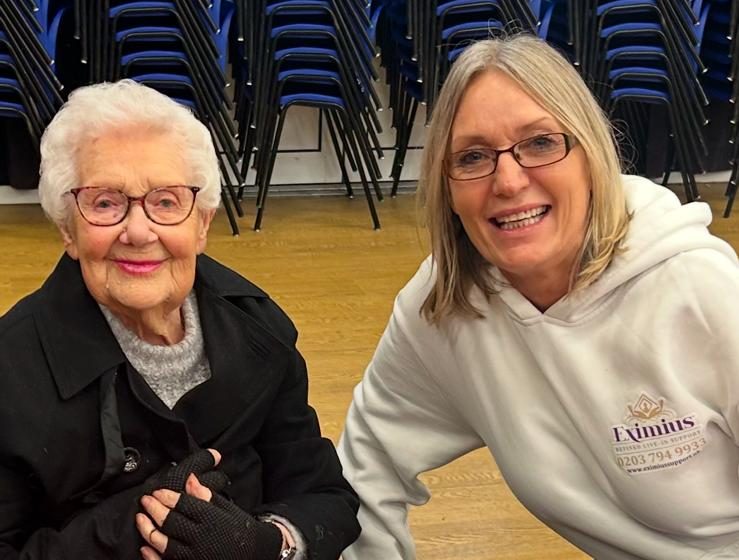
Eximius Live-In Care was proud to support The Beaconsfield School’s Senior Citizens Christmas Lunch! The event featured a delicious three-course meal, with mains prepared by the school chef and desserts crafted by talented pupils who also created festive biscuits for guests to take home.
Around 40 local residents and care home guests attended, enjoying a day filled with warmth, music, and festive cheer. Pupils not only served the meals but also entertained with singing and musical performances, making the atmosphere truly special. They spent time socialising with guests, ensuring everyone felt included and valued.
A standout moment was seeing 104-year-old Peggy, supported by our team, enjoying the event and spreading smiles. It was a fantastic day for all involved, filled with joy, connection, and the true spirit of the season.
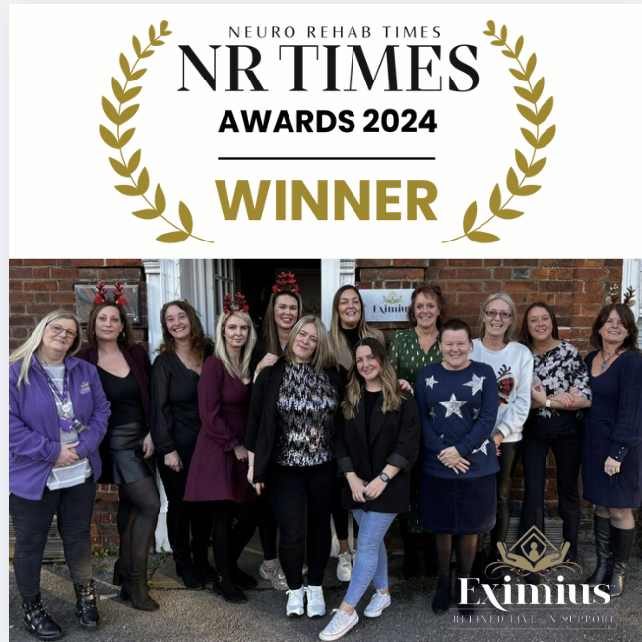
Eximius Live-In Care is proud to announce that we have been awarded the prestigious title of ‘Care Provider of the Year’ by the Neuro Rehab Times. This esteemed accolade recognises our unwavering commitment to delivering exceptional, person-centred live-in care that supports the unique needs of our clients.
The award celebrates Eximius’s dedication to providing outstanding care, particularly in the field of neuro-rehabilitation. Our team works tirelessly to ensure that every client receives tailored support, promoting independence, dignity, and a high quality of life in the comfort of their own homes.
“We are deeply honoured to receive this recognition from Neuro Rehab Times,” said Maria Climie, Managing Director. This award is a testament to the dedication and passion of our incredible team, who go above and beyond every day to provide exceptional care. It reflects our commitment to excellence and our focus on making a real difference in the lives of our clients and their families.”
The Neuro Rehab Times Awards are highly regarded in the healthcare industry, recognising organisations and individuals who demonstrate innovation, compassion, and exceptional standards of care.
About Eximius Live-In Care
Eximius Live-In Care specialises in providing outstanding live-in care services tailored to meet the unique needs of clients. Rated CQC Outstanding, the company is known for its commitment to delivering compassionate, high-quality, and person-centred care. With a focus on rehabilitation, recovery, and independence, Eximius helps clients lead fulfilling lives in the comfort of their own homes.
For more information about Eximius Live-In Care and the services we provide, please visit https://www.eximiussupport.uk
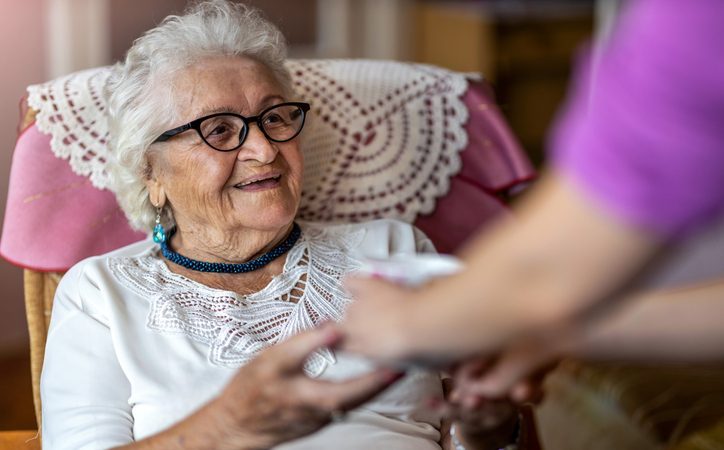
If you’re wondering what the cost of home care in the UK is currently, we can tell you that the Homecare Association recently announced that the average cost of an hour of domiciliary care has risen to £32.14. This price increase highlights the growing appeal of live in care, not only as a more personal and comfortable option but also as a significantly more cost effective solution.
If we break down the numbers, we can see that if a person requires 10 hours of domiciliary care daily, the weekly cost amounts to a staggering £2,249.80. By contrast, the cost of a live-in carer through Eximius Support is currently set at £1,675 per week. That’s a saving of over £570 per week!
Importantly, we have committed to maintaining this price even after April 2025, despite the anticipated increase in National Insurance Contributions outlined in the recent Budget.
The Benefits of Live In Care
Beyond the financial savings, live in care offers a range of unique advantages that can significantly enhance quality of life. For more details, visit our blog post here.
- Consistency and Familiarity: Unlike rotating domiciliary carers, live-in care provides the reassurance of having the same dedicated person by your side every day. This consistency fosters trust and a strong personal bond.
- Comfort of Home: Remaining in a familiar environment surrounded by personal belongings and memories can be incredibly comforting, particularly for those with dementia or other cognitive conditions. Learn more about our specialist dementia care services. [link to dementia info – either a blog post or a page]
- Becoming Part of the Family: Over time, a live in carer often becomes more than just a care provider – they become a trusted companion and an integral part of the family.
With the rising costs of domiciliary care, live in care presents an increasingly compelling option for those seeking high quality care at home. Not only does it offer significant financial savings, but it also ensures continuity, comfort, and a personal touch that can transform the care experience.
At Eximius Live in Care, we remain committed to providing exceptional care at a fair price, helping families navigate their care needs with confidence and peace of mind.
Get in touch with us here Contact us here.
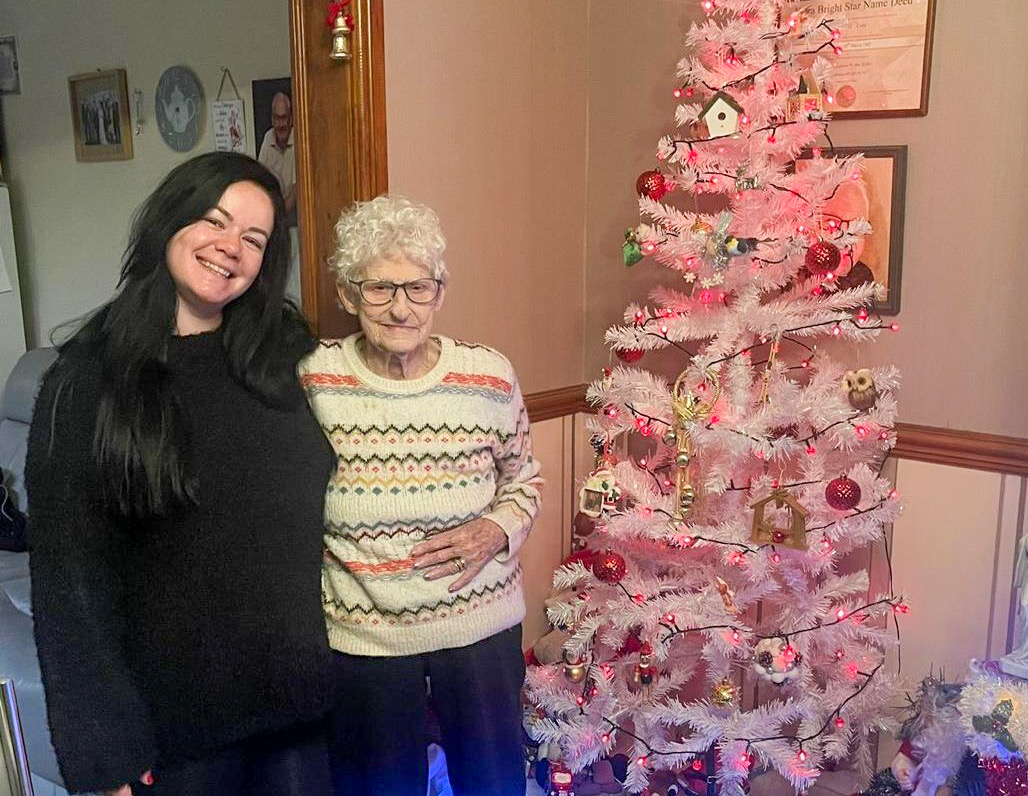
The holiday season is a time of joy, warmth, and connection, but for many older individuals, it can also be a period marked by feelings of loneliness and isolation. As the festivities arrive, it’s crucial to recognise the importance of company for older adults during this time. Loneliness among older adults is a prevalent issue, especially during the holidays, and understanding its impact on mental and physical health is essential.
Loneliness and Isolation Among Older Adults
Statistics reveal a concerning trend of increased loneliness among older adults during the holiday season. The emotional toll of isolation can have far-reaching consequences on mental and physical well-being. Older individuals, who may already face unique challenges, find themselves particularly vulnerable during this time.
Social Connection and Emotional Well-being
Social interactions play a vital role in emotional well-being, and the holidays provide an opportune time to emphasise the importance of companionship. Research consistently shows that having company significantly influences mental health, positively affecting overall happiness and life satisfaction.
Family Bonds and Intergenerational Connections
For many older people, the holidays hold special meaning regarding family gatherings. Strengthening intergenerational ties during this season not only enhances the festive experience but also contributes to a sense of continuity and shared history. Engaging in activities that promote meaningful connections between generations creates lasting memories.
Community Engagement and Events
Community events are invaluable in combating holiday loneliness. Showcasing local programmes and activities tailored for older adults encourages participation in the broader community. By attending festivities, older people can not only enjoy the holiday spirit but also establish connections with neighbours and fellow community members.
Volunteering and Giving Back
Volunteering during the holidays is a meaningful way for older adults to combat loneliness. Engaging in charitable activities provides a sense of purpose and connection. They can contribute to the community, creating a spirit of ‘giving back’ that benefits others and enhances their own well-being.
Technology and Virtual Connections
Virtual connections have become a powerful tool to bridge gaps for older adults. Whether through video calls or online community engagement, people can stay connected with loved ones, even from a distance. Technological avenues offer a lifeline for those physically separated from family and friends.
Recognising Signs of Isolation and Providing Support
Identifying signs of isolation in older individuals and offering support is crucial. By encouraging open communication, carers, neighbours, and community organisations can play a vital role in reaching out to those experiencing loneliness. A collective effort to address these signs can significantly impact a person’s well-being.
Recognising the challenges of loneliness, encouraging connections through family, community, volunteering, and technology, and cultivating inclusivity in holiday celebrations are crucial steps. As we celebrate the season, let’s strive to make it a time of warmth, inclusion, and meaningful companionship for older people, ensuring that no one feels alone during this festive time.
If you or a loved one could benefit from extra help and support at home, don’t hesitate to contact Eximius. Our team is here to provide the support you need. Contact us to learn more about how we can help you.
Further Reading:
Are Pets a Good Idea for the Elderly
5 Easy Tips to Stay Physically and Mentally Active in Later Life
11 Tips to Encourage Eating in Elderly People with no Appetite